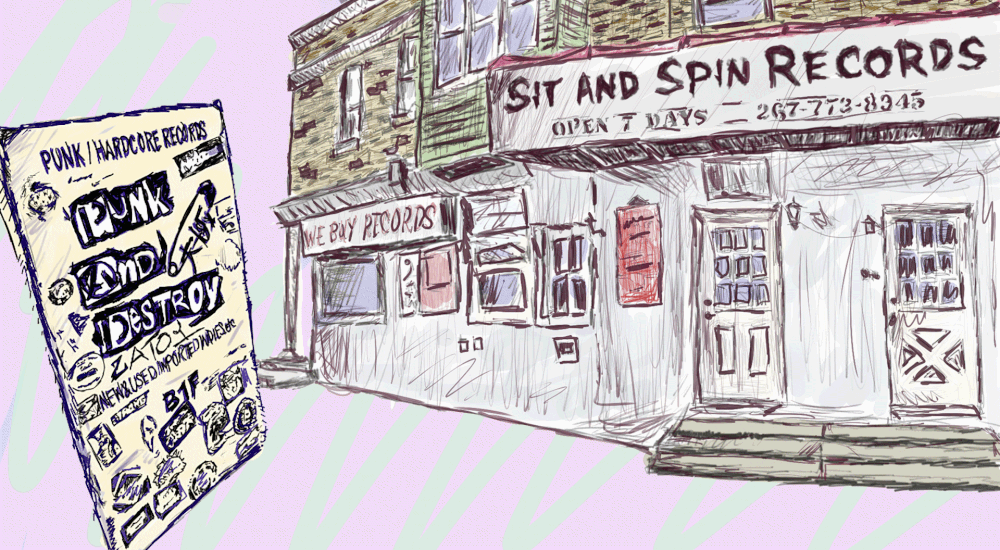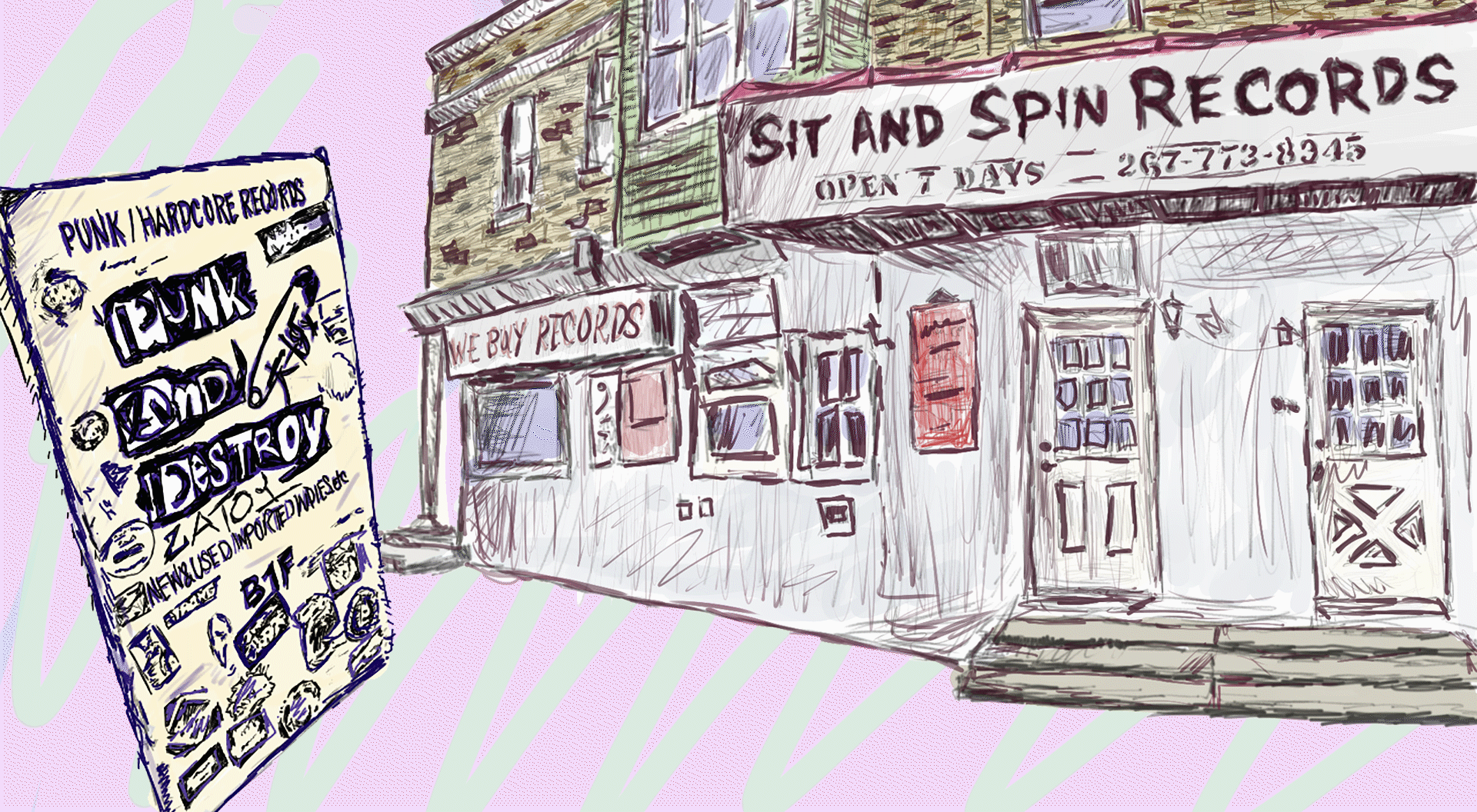This is part two of a two-part series about record stores in Japan. If you missed the first half, check it out here and let Dan Drago give you a mini-tour of Japanese record stores!
In the heart of the Nipponbashi neighborhood in Osaka, you can find anything. It’s home to the famous Den-Den Town, where you can find any anime related toys, t-shirts, DVDs, or basically anything that you’ve ever wanted. There’s Kuromon Market, one of the city’s many outdoor markets. There’s the Amerikamura, a shopping district full of vintage clothing, souvenirs, coffee roasters, bars, and record stores…
In the Nipponbashi alone, there are two dozen or more record stores, all of them with their own specialization. One of those stores is Punk And Destroy, specializing in both Japanese and Western punk and hardcore. Record shops (and many other small businesses) in Japan typically don’t occupy the ground floor. You’ve got to go up, sometimes climbing flights of stairs up to the 4th or 5th floor of a building. In the case of Punk And Destroy, I went down into the basement.
It was a bit of a maze down there, to say the least. There are doors to small bars, clothing boutiques, bike repair shops, and more. After taking several wrong turns and asking the owner of a vintage clothing store for directions, I found a record shop the size of a large storage closet, staffed by a quiet but intense guy named Kazuhiko.
Kazu’s English was excellent, and we chatted a bit about what kind of music I was into, what shops I had already checked out in Osaka, and how I liked the city so far. Then, the following happened1:
Kazu: Are there good punk record stores in Philadelphia?
Me: Funny you ask that. There’s a great one just a couple of blocks down the street from me.
Oh cool. What’s it called?
Sit and Spin Records.
[contemplative] Hmm…Sit and Spin Records…
Yeah, they’ve been around for a while, they even have a record label.
[still contemplative] Sit and Spin… Colin and Leora, right?
[gobsmacked] Whoa! You know them??
Yes, they’ve come here many times.
There’s always that moment of serendipity whenever you find out that your one friend knows your other friend, or something relatively common like that. It happens all the time to me here at home. It’s quite another to be halfway across the world, and a random record store owner name checks the owners of your local record shop. So I pressed Kazu more.
Turns out, Colin McMahon and Leora Colby, owners of Sit and Spin Records on West Passyunk in South Philadelphia, have been traveling to Japan fairly regularly for years on buying trips, to see Western and Japanese punk bands play, and for their own general enjoyment.
Once I got home, I immediately got in touch with them and asked if I could come by the shop and talk about their connection to Punk and Destroy, Kazu, and the punk and hardcore scene in Japan. Colin was happy to talk about their experiences over there.

Me: What brought you to Japan in the first place? When was your first trip over there?
Colin: 2016 was the first time we went over there. Really, it was kind of just a vacation. And a friend of ours had been over there and bought records. So he kind of gave us the lowdown on cool shops and stuff like that. We kind of made a plan, and then we switched it up last minute after we found out about a bunch of shows.
So we were like, “Okay, well, instead of spending the first part of our trip in Tokyo, we’re gonna spend the first part of our trip in Osaka,” because there were some shows that we were going to be able to catch in both places if we switched up our days.
Prior to visiting, what were your impressions?
I feel like I try to not give myself too many expectations. I just knew it was gonna be… I don’t know that culture shock is really the right word? I knew it was going to be way different than anywhere we had been, especially since this was really the first time we were going to a non-English speaking country. So that was, in itself, going to have its own challenges. We’d only been out of the country as far as, like, a few places in Europe, you know?
I found it really not being as difficult as I would have anticipated, understanding a very minimal amount of Japanese. It was actually very easy for taking the trains and everything else.
I joke that if you know colors, numbers, and letters, [then] you can figure out your train situation.
Yeah, it definitely was so much easier than I was expecting.
What did you find, particularly in the case of record shopping? What were your first impressions of the record shops over there?
I noticed a lot of stuff that you don’t see over here, because of when it had come out [in the] 90s, and early 2000s. I noticed tons of that stuff being over there, compared to over here. Also, just in general, I found a lot of the shops were pretty small, and very focused on what they did, and just had a great stock that was really focused on whatever genre or sub-genre they were trying to cover.
When was the first time you set foot in Punk and Destroy?
That was probably the second day we were in Osaka because we were not staying too far [away]. I had known about that shop before we got there. I just had a friend of ours [Bobby Egger], he has a shop in Richmond, Vinyl Conflict Records. He had been over there. And he had given me a lot of tips of record stores he went to and ones that he found a lot of cool stuff at. We have a similar interest in the kind of stuff we’re looking for.
What was your first impression of the shop when you walked into it? Because just finding it on my own was a bit of a thing.
I saw a ton of cool stuff, a lot of cool Japanese records that are pretty uncommon over here in the states. I was definitely excited to start looking around and seeing what we’d find. There used to be a bar right across the hall from him, they would just stay open all night. It was a punk kind of bar. We ended up over there a lot of nights. [After a show] everybody would kind of hang out there and a few times after [Kazu] was closing up shop, [he] hung out over there.
And he had helped us when we had an issue with a box of records we had mailed back. Something was filled out wrong on the customs paperwork. And we couldn’t talk to anybody, so he called the post office for us and was able to smooth everything out.
How has your relationship grown? Obviously, you went back multiple times as you went back to Japan.
Every time we go down there, we always stop in and always make sure we say “What’s up” to Kazu. We haven’t been there since 2019. And from what I understand, the bar that was across the hall is closed now.
Do you have relationships out there in Japan with other places or with [record] buyers?
There’s definitely some other record shops [and] owners we met when we were over there. [They] were super cool to us, too. [In] Hiroshima, there was another shop down there, Disk Shop Misery. The owner [Shinji] showed us around and took us around and gave us a little bit of history and that sort of thing.
It’s cool to have that network. It’s very cool. Honestly, a lot of the smaller shops, when we met owners and we told them we had a shop, they were all super friendly. That’s cool.
Yeah, it’s like this small club. Even in this country, there’s not a lot of people running independent record stores.
I remember though, that when I was [in Osaka], they had, like, a map.
Yes! The Osaka Record Map! They still have it now, it’s updated.
What are some of your favorite Japanese groups now? And what were some of the first ones that you ever remember getting turned on to?
I would say probably some of the first ones I’ve ever got turned on to would be Gauze and The Stalin. Those were some of the first bands I would say. There’s a band from Osaka that I think are really good called X-VIDEO. It’s kind of like, 70s punk style type stuff.
The one thing I noticed is, compared to over here, bands exist for so long over there. I remember seeing bands that had been playing for, like, ten years, but just have never recorded anything. But they keep playing. They’ll play when bands tour through, but just don’t actually put anything out. And some of our friends we’ve talked to over there would say ten years for a band to exist is not a long time, where I feel like over here, that’s a long time if a band can manage to stay together.
You can visit Sit and Spin in South Philadelphia, as well as online through their well organized website. As for Punk and Destroy in Osaka? That may require some additional planning.
I found it amazing, and rather heartening, that something as specific as independent punk record stores could spark friendship and commonality that spans across the globe. I was delighted to have met Kazu, and also glad that our meeting made me able to highlight a great record shop in Philadelphia. The world is vast, but it’s also not that big when you spend your life amidst very specific communities. My trip was just another example of that. Miles are just distance. Borders and countries are creations. People and their passions are what hold us together.
Enjoy this article? Like our live sessions? Consider subscribing to us on Patreon and help us support independent musicians and our writers!
- This dramatization is paraphrased and completely from my memory. ↩︎

